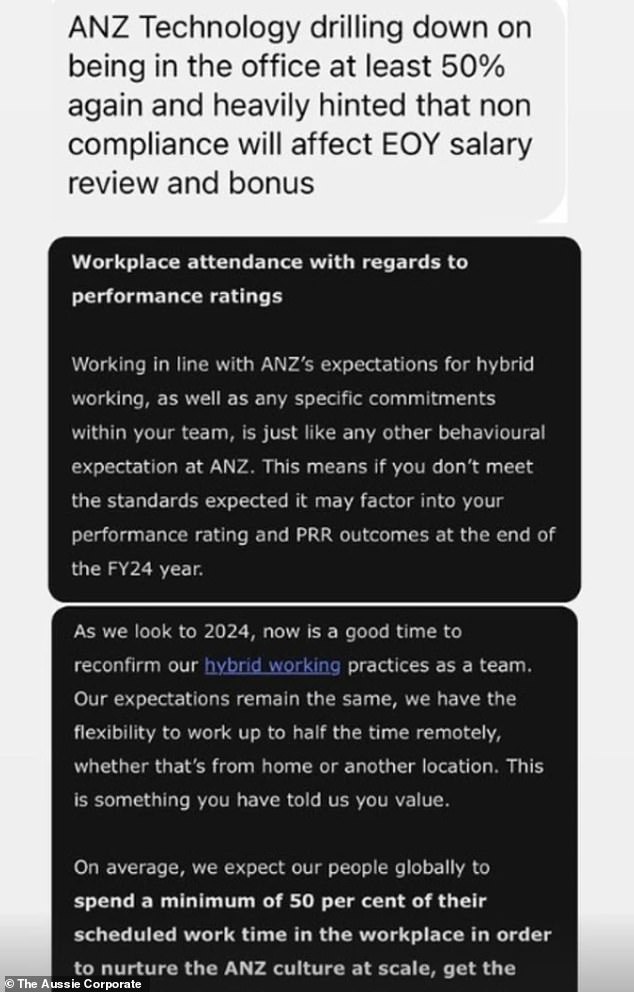ANZ Bank makes a huge call about WFH as managers in Australia, New Zealand, the Philippines and India email staff with a stark warning
ANZ employees are being warned that their annual bonuses could be reduced if they spend less than 50 percent of their scheduled hours in the office.
ANZ managers in Australia, New Zealand, Manila and Bengaluru sent an email to their respective teams this week detailing the new policy.
The email confirmed the bank’s expectations for hybrid work, with employees expected to spend at least half of their monthly working hours in the office.
The policy also warns that employees could have their performance appraisal and annual bonuses impacted if they don’t meet the 50 percent monthly requirement.
The email noted that the bank’s hybrid work policy is “just like any other behavioral expectation.”
ANZ managers sent an email to their respective teams this week explaining that their annual performance reviews and bonuses will be affected if they do not comply with the bank’s hybrid working policy
“Working in line with ANZ’s expectations for hybrid working, as well as any specific agreements within your team, is just like any other behavioral expectation at ANZ,” read the email, as reported by The Australian Financial Statement and Instagram page The Aussie Corporate.
‘This means that if you do not meet expected standards, this could play a role in your performance review and PRR (performance and reward assessment) results at the end of FY24.’
More than two-thirds of Australians were working from home during the Covid pandemic in mid-2021.
While the amount of work done from home has declined since the pandemic officially ended on May 5, a whopping 88 percent of companies say their workforces are still at least partially hybrid.
Many companies tell their staff to expect them at the office more often, even on certain days. But they encounter ‘resistance’ to a full return to work.
ANZ’s 50 percent target puts the bank in line with companies such as Suncorp Group and Origin Energy, where office attendance is linked to annual performance and bonuses.
ANZ chief executive Shayne Elliott said 40 per cent of staff attended the bank’s offices from October 2023, despite the policy coming into effect in November last year.
“We are two-thirds of what we used to be,” Elliott told Radio 3AW last month.
The email reportedly claimed that working in an office offers many benefits, including developing and maintaining networks, opportunities to learn and maintaining a sense of belonging.
The email urged staff to “adjust” their work patterns to ensure they meet the 50 percent mandate.
‘If you work from your ANZ workplace less than half the time, on average over a calendar month, make the necessary adjustments to increase your presence so that you help maintain the great culture we are at ANZ are known for,” the emails read.
The email advised staff that the 50 percent attendance rule provided enough flexibility to “accommodate virtually all personal circumstances.”

The email explains that staff are expected to spend at least 50 percent of their scheduled monthly working time in the office
Employees can request an exemption from the policy. This will only be granted under ‘exceptional circumstances that justify greater flexibility’.
“In these cases, a temporary period of greater flexibility (i.e. up to two months) may be considered by your grassroots leader as an informal exception to the minimum 50 percent attendance expectation,” the email said.
‘Longer periods of flexibility require a formal exception signed by a Group 2 (or higher) leader and then by your Exco [executive committee] leader.’
ANZ leaders believe the 50 percent target is a balance between providing flexibility for staff and promoting personal collaboration and mentoring.
It comes after a company won a court ruling against an employee who asked to work from home 100 percent of the time, in an initial test of new workplace legislation.
The Fair Work Commission on November 16 rejected a father’s request to work exclusively from home on health and parenting grounds.

The email claimed that working in an office brings many benefits, including developing and maintaining networks, opportunities to learn and maintaining a sense of belonging (stock image of an employee working in an office)
The tribunal found that salary packaging company Maxxia had “reasonable business reasons” to reject a Sydney business consultant’s plea to work from home 100 percent of the time.
A staggering number of Australian bosses have also revealed they are prepared to cut wages and benefits for staff who choose to work from home.
The shocking revelation was made in a global investigation conducted by law firm Herbert Smith Freehills (HSF) and the findings were released on October 30.
About 37 percent of senior executives announced plans to differentiate between remote and in-office employee pay over the next three to five years.
